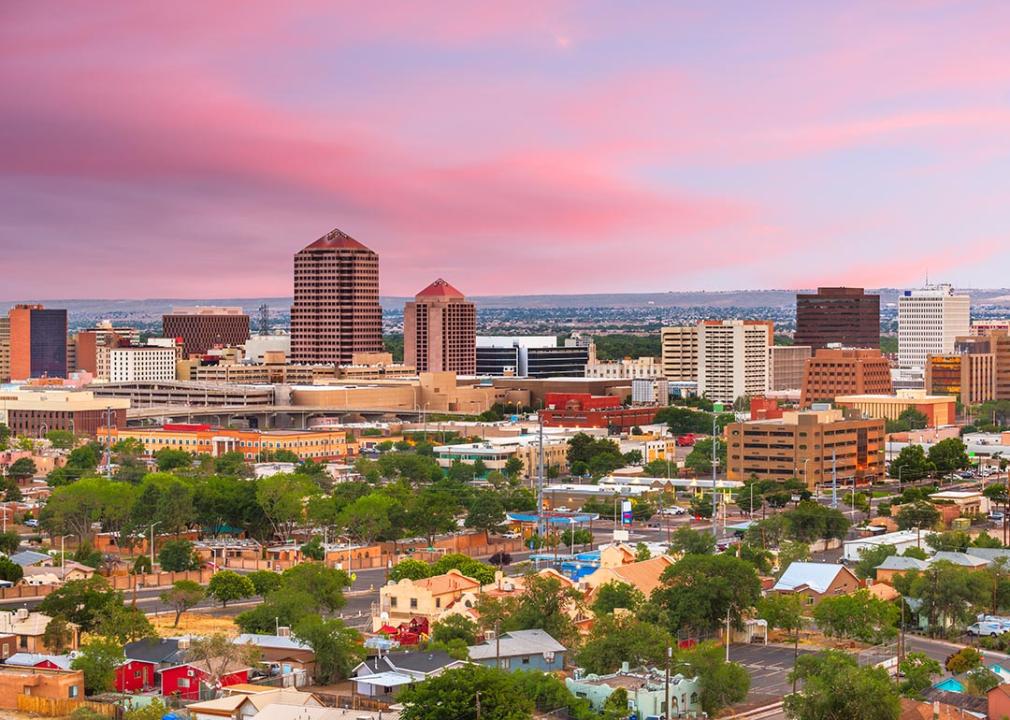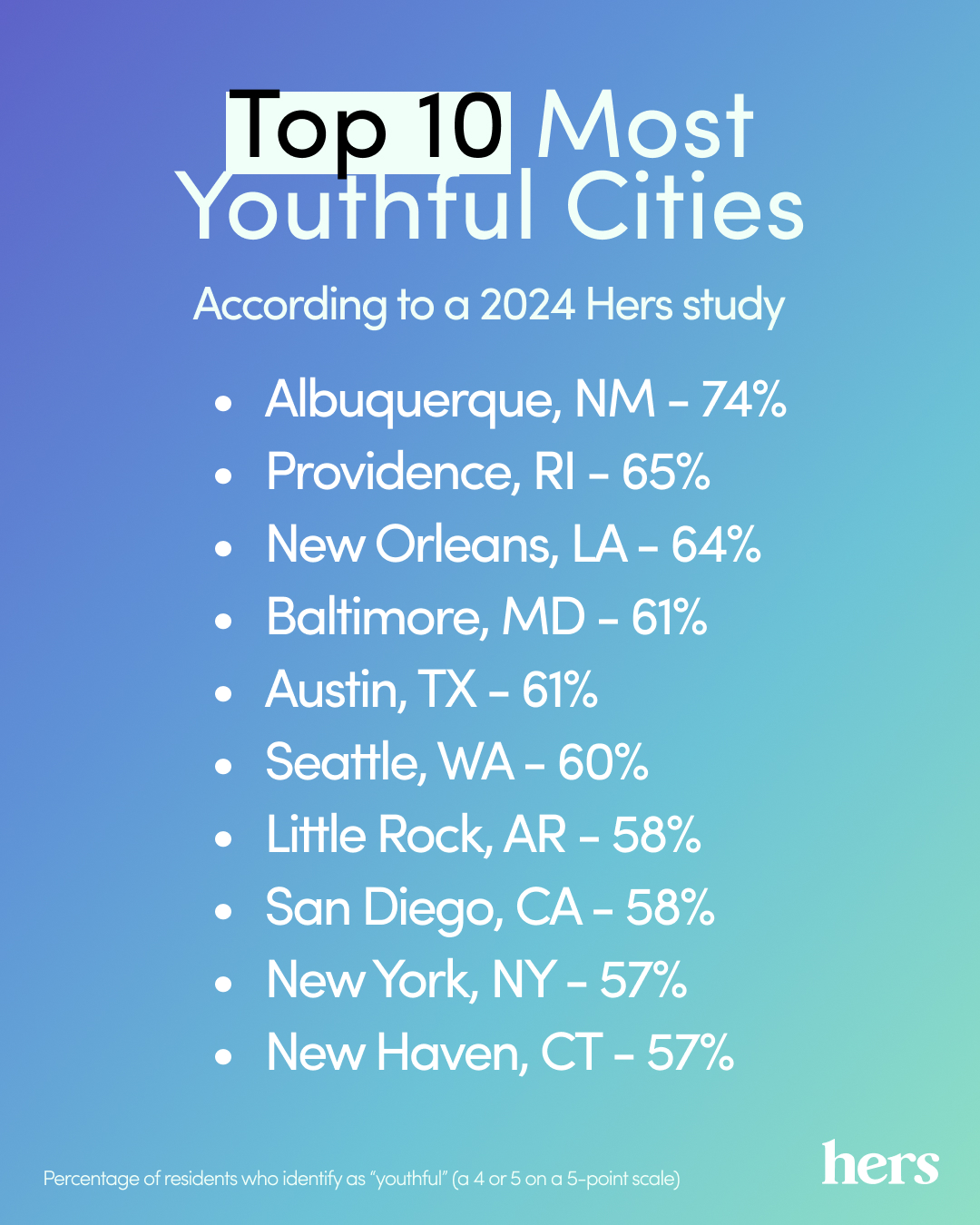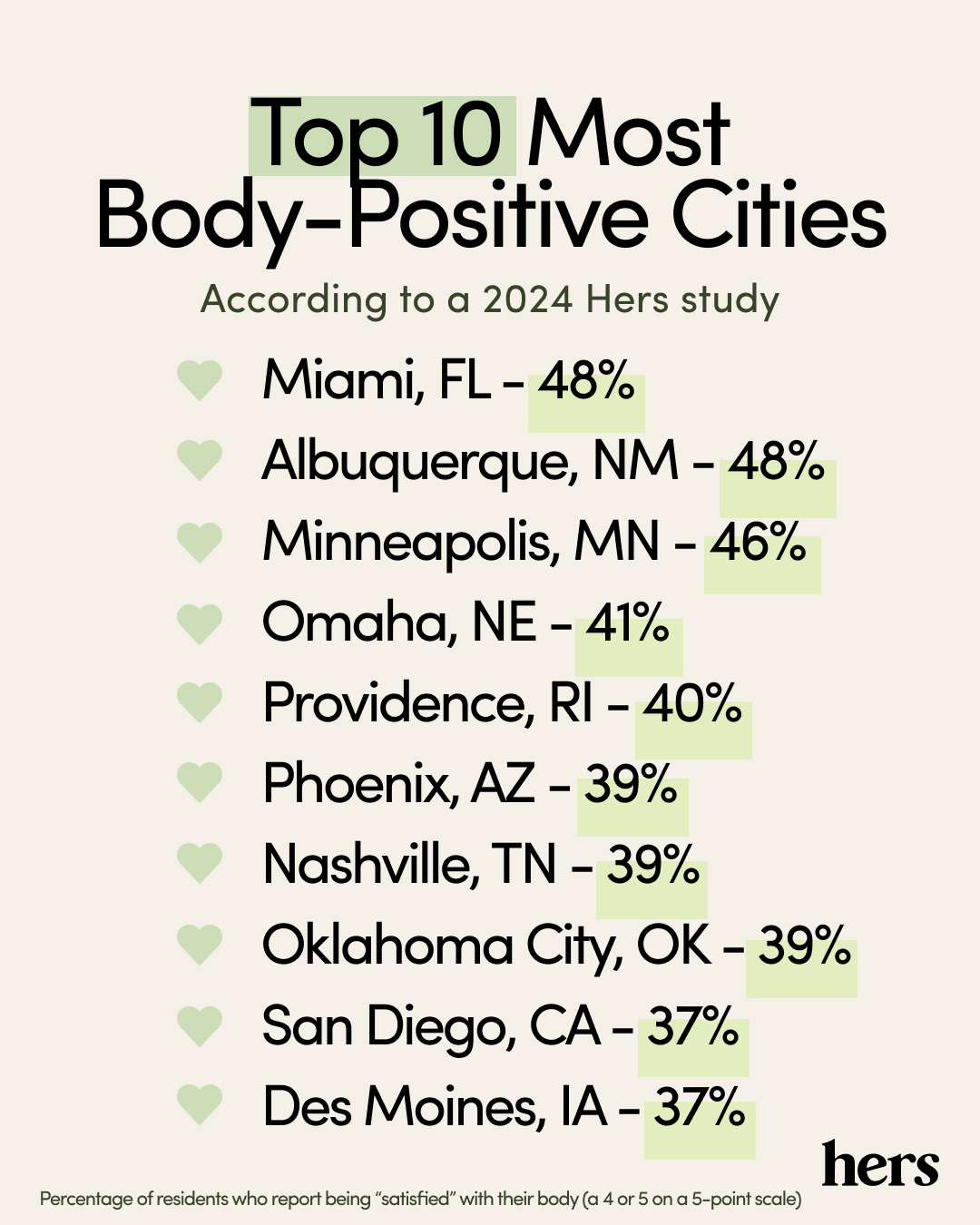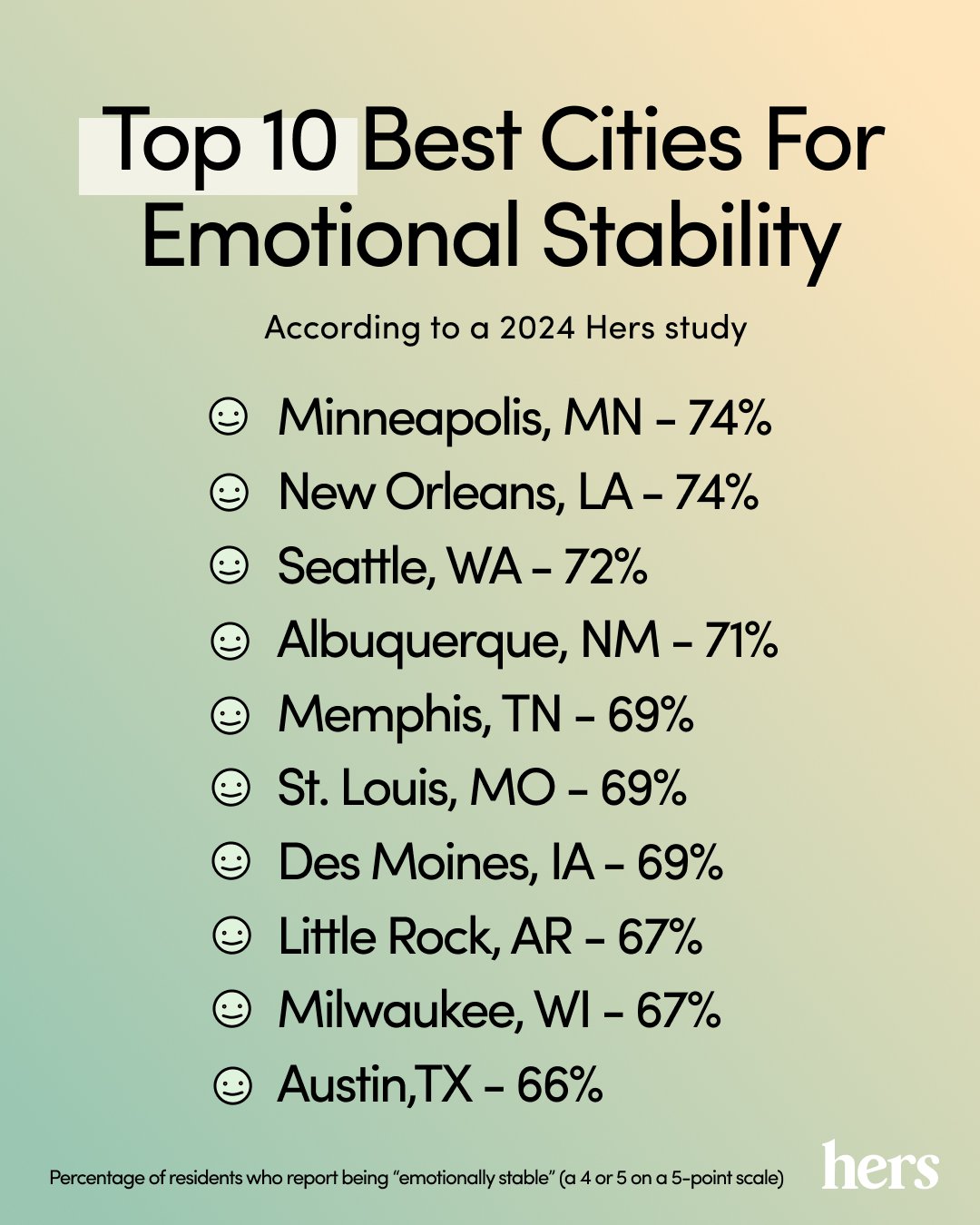Melissa Lavigne-Delville

Sean Pavone // Shutterstock
With National Wellness Month around the corner, Hers surveyed residents across America to see how they rated themselves in youthfulness, body positivity, emotional stability, and more.
Short of surrounding ourselves with the red rocks of Sedona or the spiritual energy of Mount Shasta, we wondered if top ranking cities had any self-care shortcuts the rest of us can replicate in pursuit of wellness. Here are the cities that came out on top and what we can learn from each.
Most Youthful City: Albuquerque, New Mexico
According to a 2024 Hers study, surveyed residents of Albuquerque, New Mexico, are the most likely of any metropolitan area in the U.S. to identify as "youthful." 74% describe themselves as youthful, compared to just 51% of Americans overall.
A good night's sleep may have something to do with it, with only 10% of Albuquerque and Santa Fe, New Mexico's population describing themselves as tired, as compared to 16% of people across the country. What's more? Only 13% say that being too tired, or fatigued, is the reason they don't have more sex than they do, as compared to nearly 1 in 5 (19%) of U.S. residents overall.
Getting enough sleep may even help with weight management. 83% of Albuquerque and Santa Fe's population describes themselves as "healthy" vs. just 60% of the population overall.

Most Youthful to Least Youthful Cities

Hers
Percentage of residents who identify as "youthful" (a 4 or 5 on a 5-point scale)
- Albuquerque, NM, 74%
- Providence, RI, 65%
- New Orleans, LA, 64%
- Baltimore, MD, 61%
- Austin, TX, 61%
- Seattle, WA, 60%
- Little Rock, AR, 58%
- San Diego, CA, 58%
- New York, NY, 57%
- New Haven, CT, 57%
- Houston, TX, 57%
- Miami, FL, 57%
- Salt Lake City, UT, 57%
- Minneapolis, MN, 57%
- Norfolk, VA, 56%
- Birmingham, AL, 56%
- Phoenix, AZ, 56%
- Des Moines, IA, 56%
- Omaha, NE, 56%
- Memphis, TN, 55%
- San Francisco, CA, 55%
- Chicago, IL, 53%
- Honolulu, HI, 52%
- St. Louis, MO, 52%
- Kansas City, KS, 51%
- Boston, MA, 50%
- Washington DC, 49%
- Milwaukee, WI, 49%
- Philadelphia, PA, 48%
- Nashville, TN, 48%
- Indianapolis, IN, 48%
- Dallas, TX, 47%
- Orlando, FL, 47%
- Raleigh, NC, 47%
- Sacramento, CA, 47%
- Las Vegas, NV, 47%
- Pittsburgh, PA, 46%
- Atlanta, GA, 46%
- Greenville, SC, 46%
- Los Angeles, CA, 46%
- Tampa, FL, 45%
- Charlotte, NC, 45%
- Louisville, KY, 44%
- Denver, CO, 43%
- Portland, OR, 43%
- Columbus, OH, 41%
- Oklahoma City, OK, 39%
- Detroit, MN, 39%
- Cleveland, OH, 39%
- San Antonio, TX, 38%
Tip: Create a Sleep Sanctuary
- Optimize your sleep environment. Design your bedroom to promote restorative sleep. Research suggests that optimizing your sleep environment can enhance sleep quality. Use blackout curtains to block out light, maintain a comfortable room temperature, and consider using white noise machines to minimize disruptions.
- Establish a consistent sleep schedule. Research has found that chronic poor sleep quality is associated with signs of intrinsic aging. It can also affect anxiety. Aim to go to bed and wake up at the same time each day, even on weekends.
- Practice relaxation techniques. Incorporate relaxation techniques like meditation or deep breathing exercises into your bedtime routine. These practices can help quiet your mind and promote better sleep quality and overall wellness.
Most Body-Positive City: Miami, Florida
Nearly half of surveyed Miami residents (48%) are satisfied with their bodies as compared to 32% of Americans overall. A similar 49% say their weight is in check vs. 31% of the country on average. And 65% describe themselves as "attractive" or "very attractive" as compared to 60% of the U.S. overall.
Furthermore, 70% of Miami respondents describe themselves as confident or very confident as compared to 63% of people overall, and 50% are self-described extroverts vs. 42% of others. Miami residents also over-index in feeling sexual, with 57% describing themselves as sexual or very sexual vs. 51% of the general population.
Most Body-Positive to Least Body-Positive Cities

Hers
Percentage of residents who report being "satisfied" with their body (a 4 or 5 on a 5-point scale)
- Miami, FL, 48%
- Albuquerque, NM, 48%
- Minneapolis, MN, 46%
- Omaha, NE, 41%
- Providence, RI, 40%
- Phoenix, AZ, 39%
- Nashville, TN, 39%
- Oklahoma City, OK, 39%
- San Diego, CA, 37%
- Des Moines, IA, 37%
- Little Rock, AR, 36%
- Philadelphia, PA, 36%
- St. Louis, MO, 36%
- Norfolk, VA, 36%
- Memphis, TN, 35%
- San Francisco, CA, 35%
- New Haven, CT, 34%
- Washington DC, 34%
- Indianapolis, IN, 34%
- Birmingham, AL, 34%
- Pittsburgh, PA, 34%
- Boston, MA, 33%
- New Orleans, LA, 33%
- New York, NY, 33%
- Milwaukee, WI, 33%
- Cleveland, OH, 32%
- Baltimore, MD, 32%
- Houston, TX, 31%
- Detroit, MI, 31%
- Los Angeles, CA, 31%
- Dallas, TX, 31%
- Kansas City, KS, 30%
- Chicago, IL, 30%
- Salt Lake City, UT, 30%
- Sacramento, CA, 30%
- Las Vegas, NV, 29%
- Orlando, FL, 29%
- Denver, CO, 29%
- Atlanta, GA, 28%
- Austin, TX, 28%
- Louisville, KY, 28%
- Raleigh, NC, 28%
- Seattle, WA, 27%
- San Antonio, TX, 27%
- Honolulu, HI, 27%
- Tampa, FL, 24%
- Portland, OR, 24%
- Columbus, OH, 23%
- Charlotte, NC, 22%
- Greenville, SC, 19%
Tip: Boost Your Self-Confidence
- Practice positive self-talk. Challenge negative thoughts about your body by focusing on what you love about yourself. Practice daily affirmations and remind yourself of your strengths and achievements. Positive self-talk can transform your mindset, helping you appreciate your body and feel more confident.
- Embrace a healthy lifestyle. Adopt a balanced diet and regular exercise routine. Not only does this improve physical health, but it also has mental health benefits.
- Dress to impress yourself. Opt for outfits that make you feel good about your body. Finding styles that reflect your personality can help boost your confidence. When you feel good in what you're wearing, it shows in your attitude and how you carry yourself.
Best City For Emotional Stability: Minneapolis, Minnesota
Minneapolis ranked number 1 in emotional stability, with 74% of surveyed residents saying they were highly emotionally stable (a 5 on a 5-point scale) or emotionally stable (a 4 on a 5-point scale) as compared to just 59% of Americans overall. Notably, Minneapolis was among the top 5 cities (#4) to say that its mental health has changed for the better since the pandemic.
So what's this city's secret? Maybe having an open-mind has something to do with it. Minneapolis ranked number 2, right after Seattle, in "open-mindedness," with 83% giving themselves top marks (a 4 or 5 on a 5-point scale) vs. 72% of the rest of the country.
Best to Worst Cities For Emotional Stability

Hers
Percentage of residents who report being "emotionally stable" (a 4 or 5 on a 5-point scale)
- Minneapolis, MN, 74%
- New Orleans, LA, 74%
- Seattle, WA, 72%
- Albuquerque, NM, 71%
- Memphis, TN, 69%
- St. Louis, MO, 69%
- Des Moines, IA, 69%
- Little Rock, AR, 67%
- Milwaukee, WI, 67%
- Austin, TX, 66%
- Salt Lake City, UT, 66%
- San Diego, CA, 66%
- Omaha, NE, 65%
- Orlando, FL, 64%
- New York, NY, 63%
- Philadelphia, PA, 63%
- New Haven, CT, 63%
- Las Vegas, NV, 63%
- Chicago, IL, 63%
- Cleveland, OH, 63%
- Miami, FL, 62%
- Oklahoma City, OK, 62%
- Detroit, MI, 62%
- Kansas City, KS, 61%
- Boston, MA, 60%
- Indianapolis, IN, 60%
- Columbus, OH, 60%
- Baltimore, MD, 59%
- Birmingham, AL, 59%
- Honolulu, HI, 59%
- Pittsburgh, PA, 58%
- Raleigh, NC, 58%
- Greenville, SC, 58%
- Louisville, KY, 58%
- Providence, RI, 57%
- Norfolk, VA, 56%
- San Francisco, CA, 56%
- Houston, TX, 55%
- Washington DC, 55%
- Nashville, TN, 55%
- Atlanta, GA, 52%
- Phoenix, AZ, 52%
- Sacramento, CA, 52%
- Dallas, TX, 51%
- San Antonio, TX, 51%
- Portland, OR, 50%
- Tampa, FL, 49%
- Charlotte, NC, 49%
- Los Angeles, CA, 47%
- Denver, CO, 47%
Tip: Open Your Mind to Master Your Emotions
- Practice mindfulness and meditation. Incorporate mindfulness and meditation into your daily routine. These relaxation techniques for anxiety may help reduce stress, increase emotional stability, and improve overall mental health and wellness.
- Laugh more. Engage in laughter therapy. Whether it's watching a comedy show, attending a laughter yoga class, or spending time with friends who make you laugh, humor can help reduce stress and improve your mood.
- Engage in creative expression. Channel your emotions and thoughts into creative activities. Whether it's painting, writing, playing music, or crafting, creative expression can be a therapeutic way to process feelings and improve mental health. Engaging in creative hobbies can also provide a sense of accomplishment and joy.
Data & Methodology
This study is based on a 5,504-person online survey, which included 5,000 18-to-65-year-old respondents in the top 50 metropolitan areas (100 respondents per city) and a nationally representative sample of 504 18-to-65-year-old respondents to contextualize results. The study was fielded in May 2024.
Findings were analyzed by more than 100 demographic and psychographic cuts, including city, region, gender (when we refer to "women" and "men," we include all people who self-identify as such), age, race and ethnicity, relationship status, parenting status, sexual orientation (heterosexual, bisexual, gay, lesbian, pansexual, asexual, queer, etc.), and political affiliation, among other areas of interest.
All data in this study are from this source, unless otherwise noted. Independent research firm, Culture Co-op, conducted and analyzed research and findings.
This story was produced by Hers and reviewed and distributed by Stacker Media.



